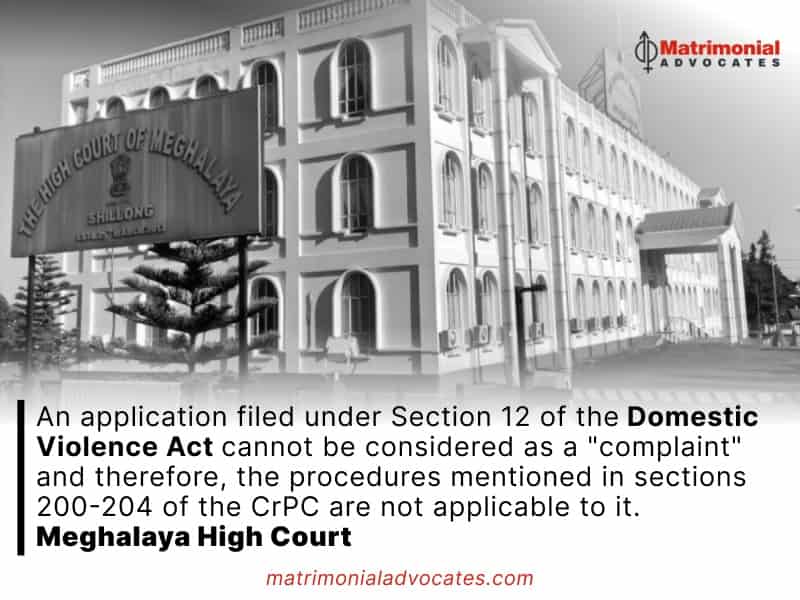
During a recent hearing of a case in which a petitioner sought the quashing of criminal proceedings under Section 12 of the Domestic Violence Act pending in the Court of the Judicial Magistrate First Class in Shillong, the Meghalaya High Court stated that any submission made under Section 12 of the Act cannot be considered a “complaint.” Thus, the procedures outlined in Sections 200, 202, and 204 of the CrPC cannot be invoked by either party or the Magistrate. Justice W. Diengdoh was part of the bench that made these remarks.
In the petitioner’s plea, it was argued that the procedures established under Section 12 of the Domestic Violence Act are of a civil nature. Accordingly, the court should issue a notice to the respondent after receiving an application from the affected party. However, according to the petitioner, the Magistrate disregarded this and summoned the petitioner to appear in court. The petitioner further alleged that during the proceedings, the Magistrate issued a bailable warrant of arrest against them, in violation of the regulations outlined in the Domestic Violence Act. Even if the application was treated as a complaint, the petitioner argued that the Magistrate failed to utilize Section 202 of the CrPC to defer the issuance of a warrant against the petitioner, who was reportedly living beyond the court’s jurisdiction.
In contrast, the respondents contended that the regulations set forth in Chapter XV of the Criminal Procedure Code are not applicable to proceedings under the Domestic Violence Act. Therefore, they asserted that there has been no violation of Section 202 of the CrPC.
Additionally, the respondents maintained that Section 13 of the DV Act mandates only that the respondent be provided with a notice of the hearing date in the prescribed format. They argued that issuing a summons under the CrPC is not necessary for proceedings under Section 12 of the DV Act.
Upon examining the opposing arguments, the court ultimately determined that Section 28 of the DV Act explicitly states that proceedings under Sections 12, 18, 19, 20, 21, 22, and 23, as well as offenses punishable under Section 31 of the DV Act, shall be subject to the provisions of the CrPC.
Additionally, the court clarified that the provisions of the CrPC are applicable to all proceedings under the sections of the DV Act mentioned earlier, unless the Act prescribes a separate procedure. The court noted that Section 31 of the DV Act is the only penal provision, which designates the breach of a protection order or interim protection order as a criminal offense punishable by a potential prison sentence of up to one year or a fine of Rs. 20,000, making it cognizable and non-bailable.
The court agreed with the respondents’ assertion that a Section 12 proceeding under the DV Act is not covered by Section 31 of the Act. The court cited the Supreme Court’s ruling in Kamatchi v. Lakshmi Narayanan (2022 SCC), which relied on the precedent established in Dr. P. Padmanathan’s case. According to the court, an application filed under Section 12 does not qualify as a complaint as defined under Section 2(d) of the CrPC. Therefore, the procedures outlined in Chapter XV of the CrPC and those for taking cognizance under Section 190(1)(a) of the Code are not applicable to proceedings under the DV Act.
The court based its decision on the Kamatchi v. Lakshmi Narayanan ruling, stating that Section 12 of the Domestic Violence Act does not fall under the definition of a complaint as per Section 2(d) of the CrPC. As a result, the procedures outlined in Sections 200, 202, and 204 of the CrPC cannot be applied to such cases. Instead, when a Magistrate receives an application under Section 12, they must issue a notice under Section 13 and ask the respondent to respond. The court rejected the petitioner’s arguments as unfounded and dismissed the petition.
Source: https://www.livelaw.in/news-updates/meghalaya-high-court-section-12-domestic-violence-act-not-complaint-section-200-crpc-procedure-223118





